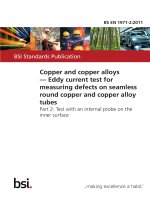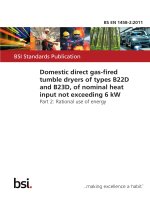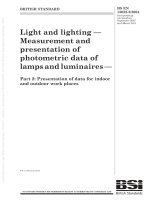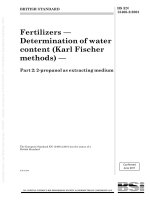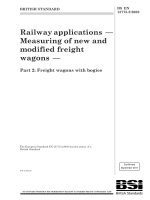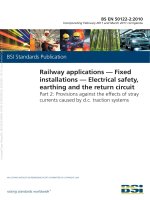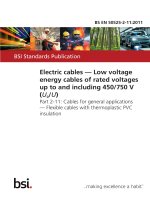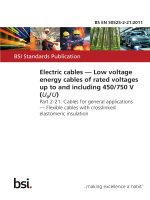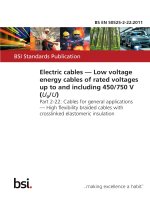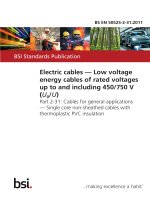Bsi bs en 61558 2 20 2011
Bạn đang xem bản rút gọn của tài liệu. Xem và tải ngay bản đầy đủ của tài liệu tại đây (1.09 MB, 22 trang )
BS EN 61558-2-20:2011
BSI Standards Publication
Safety of transformers,
reactors, power supply units
and combinations thereof
Part 2-20: Particular requirements and tests
for small reactors
BRITISH STANDARD
BS EN 61558-2-20:2011
National foreword
This British Standard is the UK implementation of EN 61558-2-20:2011. It is
identical to IEC 61558-2-20:2010. It supersedes BS EN 61558-2-20:2001
which will be withdrawn on 2 January 2014.
The UK participation in its preparation was entrusted to Technical Committee
PEL/96, Small transformers.
A list of organizations represented on this committee can be obtained on
request to its secretary.
This publication does not purport to include all the necessary provisions of a
contract. Users are responsible for its correct application.
© BSI 2011
ISBN 978 0 580 64547 1
ICS 29.180
Compliance with a British Standard cannot confer immunity from
legal obligations.
This British Standard was published under the authority of the Standards
Policy and Strategy Committee on 30 March 2011.
Amendments issued since publication
Amd. No.
Date
Text affected
BS EN 61558-2-20:2011
EUROPEAN STANDARD
EN 61558-2-20
NORME EUROPÉENNE
February 2011
EUROPÄISCHE NORM
ICS 29.180
Supersedes EN 61558-2-20:2000
English version
Safety of transformers, reactors, power supply units and combinations
thereof Part 2-20: Particular requirements and tests for small reactors
(IEC 61558-2-20:2010)
Sécurité des transformateurs, bobines
d'inductance, blocs d'alimentation et
combinaisons de ces éléments Partie 2-20: Règles particulières et essais
pour les petites bobines d'inductance
(CEI 61558-2-20:2010)
Sicherheit von Transformatoren, Drosseln,
Netzgeräten und entsprechende
Kombinationen Teil 2-20: Besondere Anforderungen und
Prüfungen an Kleindrosseln
(IEC 61558-2-20:2010)
This European Standard was approved by CENELEC on 2011-01-02. CENELEC members are bound to comply
with the CEN/CENELEC Internal Regulations which stipulate the conditions for giving this European Standard
the status of a national standard without any alteration.
Up-to-date lists and bibliographical references concerning such national standards may be obtained on
application to the Central Secretariat or to any CENELEC member.
This European Standard exists in three official versions (English, French, German). A version in any other
language made by translation under the responsibility of a CENELEC member into its own language and notified
to the Central Secretariat has the same status as the official versions.
CENELEC members are the national electrotechnical committees of Austria, Belgium, Bulgaria, Croatia, Cyprus,
the Czech Republic, Denmark, Estonia, Finland, France, Germany, Greece, Hungary, Iceland, Ireland, Italy,
Latvia, Lithuania, Luxembourg, Malta, the Netherlands, Norway, Poland, Portugal, Romania, Slovakia, Slovenia,
Spain, Sweden, Switzerland and the United Kingdom.
CENELEC
European Committee for Electrotechnical Standardization
Comité Européen de Normalisation Electrotechnique
Europäisches Komitee für Elektrotechnische Normung
Management Centre: Avenue Marnix 17, B - 1000 Brussels
© 2011 CENELEC -
All rights of exploitation in any form and by any means reserved worldwide for CENELEC members.
Ref. No. EN 61558-2-20:2011 E
BS EN 61558-2-20:2011
EN 61558-2-20:2011
-2-
Foreword
The text of document 96/356/FDIS, future edition 2 of IEC 61558-2-20, prepared by IEC TC 96,
Transformers, reactors, power supply units, and combinations thereof, was submitted to the
IEC-CENELEC parallel vote and was approved by CENELEC as EN 61558-2-20 on 2011-01-02.
This European Standard supersedes EN 61558-2-20:2000.
The main changes consist of updating this part in accordance with EN 61558-1:2005.
This part has the status of a group safety publication in accordance with IEC Guide 104:1997, The
preparation of safety publications and the use of basic safety publications and group safety publications.
Attention is drawn to the possibility that some of the elements of this document may be the subject of
patent rights. CEN and CENELEC shall not be held responsible for identifying any or all such patent
rights.
The following dates were fixed:
– latest date by which the EN has to be implemented
at national level by publication of an identical
national standard or by endorsement
(dop)
2011-10-02
– latest date by which the national standards conflicting
with the EN have to be withdrawn
(dow)
2014-01-02
This part is intended to be used in conjunction with the latest edition of EN 61558-1 and its amendments.
It is based on EN 61558-1:2005.
This part supplements or modifies the corresponding clauses in EN 61558-1, so as to convert that
publication into the European standard: Particular requirements and tests for small reactors.
Where a particular subclause of Part 1 is not mentioned in this part, that subclause applies as far as is
reasonable. Where this part states "addition", "modification" or "replacement", the relevant text of Part 1 is
to be adapted accordingly.
In this part, the following print types are used:
– requirements proper: in roman type;
– test specifications: in italic type;
– explanatory matter: in smaller roman type:
In the text of this part, the words in bold are defined in Clause 3.
Subclauses, notes, figures and tables additional to those in Part 1 are numbered starting from 101;
supplementary annexes are entitled AA, BB, etc.
Annex ZA has been added by CENELEC.
__________
-3-
BS EN 61558-2-20:2011
EN 61558-2-20:2011
Endorsement notice
The text of the International Standard IEC 61558-2-20:2010 was approved by CENELEC as a European
Standard without any modification.
In the official version, for Bibliography, the following notes have to be added for the standards indicated:
IEC 60289:1988
NOTE Harmonized as EN 60289:1994 (modified).
IEC 61347-2-8:2000
NOTE Harmonized as EN 61347-2-8:2001 (not modified).
IEC 61347-2-9:2000
NOTE Harmonized as EN 61347-2-9:2001 (not modified).
IEC 61558-2-16:2009
NOTE Harmonized as EN 61558-2-16:2009 (not modified).
__________
BS EN 61558-2-20:2011
EN 61558-2-20:2011
-4-
Annex ZA
(normative)
Normative references to international publications
with their corresponding European publications
The following referenced documents are indispensable for the application of this document. For dated
references, only the edition cited applies. For undated references, the latest edition of the referenced
document (including any amendments) applies.
NOTE When an international publication has been modified by common modifications, indicated by (mod), the relevant EN/HD
applies.
Annex ZA of Part 1 is applicable except as follows:
Addition:
Publication
Year
Title
IEC 61558-1
2005
Safety of power transformers, power supplies, EN 61558-1
+ corr. August
reactors and similar products Part 1: General requirements and tests
EN/HD
Year
2005
2006
BS EN 61558-2-20:2011
–2–
61558-2-20 © IEC:2010
CONTENTS
1
Scope ...............................................................................................................................5
2
Normative references........................................................................................................6
3
Terms and definitions .......................................................................................................6
4
General requirements .......................................................................................................8
5
General notes on tests ......................................................................................................8
6
Ratings .............................................................................................................................8
7
Classification ....................................................................................................................9
8
Marking and other information...........................................................................................9
9
Protection against electric shock ..................................................................................... 11
10 Change of input voltage setting ....................................................................................... 11
11 Output voltage and output current under load .................................................................. 11
12 No-load output voltage .................................................................................................... 12
13 Short-circuit voltage ........................................................................................................ 12
14 Heating........................................................................................................................... 12
15 Short-circuit and overload protection ............................................................................... 12
16 Mechanical strength........................................................................................................ 14
17 Protection against harmful ingress of dust, solid objects and moisture ............................. 14
18 Insulation resistance, dielectric strength and leakage current .......................................... 14
19 Construction ................................................................................................................... 14
20 Components ................................................................................................................... 14
21 Internal wiring ................................................................................................................. 15
22 Supply connection and other external flexible cables or cords.......................................... 15
23 Terminals for external conductors ................................................................................... 15
24 Provision for protective earthing ...................................................................................... 15
25 Screws and connections ................................................................................................. 15
26 Creepage distances, clearances and distances through insulation ................................... 15
27 Resistance to heat, fire and tracking ............................................................................... 15
28 Resistance to rusting ...................................................................................................... 16
Annexes................................................................................................................................ 17
Bibliography .......................................................................................................................... 17
BS EN 61558-2-20:2011
61558-2-20 © IEC:2010
–5–
SAFETY OF TRANSFORMERS, REACTORS,
POWER SUPPLY UNITS AND COMBINATIONS THEREOF –
Part 2-20: Particular requirements and tests for small reactors
1
Scope
Replacement:
This part of IEC 61558 deals with the safety of small reactors for general applications.
NOTE 1
Safety includes electrical, thermal and mechanical aspects.
Unless otherwise specified, from here onward, the term transformer or reactor covers small
reactors.
This part is applicable to stationary or portable, single-phase or polyphase, air-cooled (natural
or forced) general purpose reactors including alternating current, premagnetised and current
compensated independent or associated reactors.
The rated supply voltage does not exceed 1 000 V a.c. or 1 500V ripple-free d.c., the rated
supply frequency and the internal operational frequencies do not exceed 1 MHz.
The rated power does not exceed:
–
25 kVAR a.c. (25 kW d.c.) for single-phase reactors,
–
50 kVAR a.c. (50 kW d.c.) for poly-phase reactors.
This part is applicable to reactors without limitations of the rated power subject to an
agreement between the purchaser and the manufacturer.
This part is applicable to dry-type reactors. The windings may be encapsulated or nonencapsulated.
This part does not apply to:
–
reactors covered by IEC 60289;
–
ballast for tubular fluorescent covered by IEC 61347-2-8;
–
ballast for discharge
IEC 61347-2-9.
lamps
(excluding
tubular
fluorescent
lamps)
covered
by
NOTE 2 For reactors filled with liquid dielectric or pulverised material such as sand, additional requirements are
under consideration.
NOTE 3
Attention is drawn to the following:
-
for reactors intended to be used in vehicles, on board ships, and aircraft, additional requirements (from other
applicable standards, national rules, etc.) may be necessary;
-
measures to protect the enclosure and the components inside the enclosure against external influences such
as fungus, vermin, termites, solar-radiation, and icing should also be considered;
-
the different conditions for transportation, storage, and operation of the reactor should also be considered;
BS EN 61558-2-20:2011
–6–
-
61558-2-20 © IEC:2010
additional requirements in accordance with other appropriate standards and national rules may be applicable to
reactors intended for use in special environments, such as tropical environment.
NOTE 4 Normally, reactors are intended to be associated with equipment for functional requirements of the
equipment or requirements by the installation rules or by other appliance specifications.
NOTE 5
Reactors incorporating electronic circuits and components are also covered by this standard.
NOTE 6 The protection against electric shock may be provided (or completed) by other parts or features of the
equipment, such as the body.
NOTE 7
Reactors for particular applications will in the future be covered by complementary normative annexes.
NOTE 8 Future technological development of reactors may necessitate a need to increase the upper limit of the
frequencies, until then this part may be used as a guidance document.
2
Normative references
This clause of Part 1 is applicable except as follows:
Addition:
IEC 61558-1:2005, Safety of power transformers, power supplies, reactors and similar products
– Part 1: General requirements and tests
3
Terms and definitions
This clause of Part 1 is applicable, except as follows:
Modification:
Where Part 1 is applicable, the word "transformer", if used, shall be replaced by "reactor".
Addition:
3.1.101
reactor
arrangement comprising one or more windings with an impedance depending on the frequency,
working in accordance with the principle of self-induction whereby a magnetising current
generates a magnetic field through a magnetically effective core or through air
NOTE
Reactors with toroidal core are also included in this definition.
3.1.102
alternating current reactor
reactor in which the magnetising current generates an alternating magnetic field, changing its
polarity depending on the frequency
3.1.103
premagnetised reactor
reactor in which the magnetising direct current generates a magnetic field of only one polarity,
while a superimposed alternating current alters the direct magnetic field depending on its
strength and the frequency
3.1.104
current compensated reactor
reactor with at least two windings on a common core, where the magnetising currents are in
opposite directions in order to reduce the magnetic flux
BS EN 61558-2-20:2011
61558-2-20 © IEC:2010
–7–
3.1.105
overload proof reactor
reactor in which the temperature does not exceed the specified limits when the reactor is
overloaded and continues to meet all requirements of this standard after the removal of the
overload
3.1.105.1
non-inherently overload proof reactor
overload proof reactor equipped with a protective device which opens the circuit, or reduces
the current in the circuit when the reactor is overloaded, and which continues to meet all
requirements of this standard after the removal of the overload and resetting or replacing of the
protective device
NOTE 1 Examples of protective devices are fuses, overload releases, thermal fuses, thermal links, thermal cutouts, PTC resistors, and automatic circuit-breakers.
NOTE 2 In case of protection by a device which cannot be replaced nor re-set, the wording "continues to meet all
requirements of this standard after removal of the overload" does not imply that the reactor continues to operate.
3.1.105.2
inherently overload proof reactor
overload proof reactor not equipped with a device to protect the reactor and in which the
temperature in the case of overload, by construction, does not exceed the specified limits and
which continues to operate and meet all the requirements of this standard after the removal of
the overload
3.1.106
non-overload proof reactor
reactor which is intended to be protected against excessive temperature by means of a
protective device not provided with the reactor and which continues to meet all the
requirements of this standard after the removal of the overload and resetting or replacing of the
protective device
3.1.107
fail-safe reactor
reactor which, after abnormal use, permanently fails to function by an interruption of the failing
circuit but presents no danger to the user or surroundings
3.4
Circuits and windings
This subclause of Part 1 is not applicable.
3.5
Ratings
This subclause of Part 1 is applicable, except as follows:
Replacement:
3.5.4
rated current
rated current, assigned to the reactor by the manufacturer including harmonics, if any, which
influence the heating of the reactor
Addition:
3.5.101
rated power
sum of the products of the rated voltage drop and the rated current at the rated frequency
for the different windings
BS EN 61558-2-20:2011
–8–
61558-2-20 © IEC:2010
3.5.102
rated inductance
inductance of the reactor designed by the manufacturer for the specified operating condition
of the reactor
NOTE The specific operating conditions of d.c. reactors are determined by the d.c. component and the
superimposed a.c. component.
3.5.103
rated resistance
d.c. resistance of a winding of a reactor designed by the manufacturer for the specified
operating conditions of the reactor
3.5.104
rated voltage drop
voltage across a winding of the reactor at the rated current and the rated frequency
assigned by the manufacturer
3.6
No-load values
This subclause of Part 1 is not applicable.
3.7
Insulation
This subclause of Part 1 is applicable.
4
General requirements
This clause of Part 1 is applicable.
5
General notes on tests
This clause of Part 1 is applicable.
6
Ratings
Replacement:
6.1
The rated supply voltage shall not exceed 1 000 V a.c or 1 500 V ripple-free d.c..
6.2 The rated power shall not exceed 25 kVAR a.c. (25 kW d.c.) for single-phase reactors
and 50 kVAR a.c. (50 kW d.c.) for poly-phase reactors, except for reactors subject to an
agreement between the purchaser and the manufacturer.
6.3 The rated supply frequency and the internal operational frequencies does not exceed
100 MHz.
6.4 The values of rated inductance and rated resistance shall be given at the rated ambient
temperature, under no load conditions, and the tolerance shall be declared by the
manufacturer.
Compliance with the requirements of 6.1 to 6.4 is checked by inspection of the marking.
BS EN 61558-2-20:2011
61558-2-20 © IEC:2010
7
–9–
Classification
This clause of Part 1 is applicable, except as follows:
7.1
Replacement:
According to their protection against electric shock:
–
class I reactors;
–
class II reactors;
–
class III reactors.
NOTE Incorporated reactors are not classified; their degree of protection against electric shock is determined by
the way in which the reactors are incorporated.
7.2
Replacement:
According to the protection against abnormal use:
–
inherently overload proof reactors;
–
non-inherently overload proof reactors;
–
non overload proof reactors;
–
fail-safe reactors.
8
Marking and other information
This clause of Part 1 is applicable, except as follows:
8.1
Replacement:
Reactors shall be marked with the following parameters:
a) rated supply voltage in volts (V);
b) rated supply frequency (ies) in Hertz (Hz):
c) rated voltage drop in volts (V) only for a.c. reactors;
d) rated power in VAR or kVAR for a.c., in watts (W) or kilowatts (kW) for d.c.;
e) rated current and harmonics, if any, in amperes (A) or milliamperes (mA);
f)
symbol or abbreviation DC for nature of direct current, if applicable;
g) symbol or abbreviation AC for nature of alternating current, if applicable;
h) rated inductance of the winding(s) in henries (H) or millihenries (mH) for reactors followed
by the appropriate tolerance;
NOTE 1
values.
Only one of the values c), d) or h) needs to be marked, as the others can be calculated from the given
i)
the reactor shall be marked with one of the graphical symbol shown in 8.11;
j)
rated resistance of the winding(s) in ohms (Ω) or milliohms (mΩ) followed by the
appropriate tolerance;
NOTE 2
The marking j) may be given in the literature instead of being marked.
k) model or type references;
l)
name or trademark of the manufacturer or responsible supplier;
BS EN 61558-2-20:2011
– 10 –
61558-2-20 © IEC:2010
m) indication of the protection index IP, if other than IP00;
n) rated maximum ambient temperature t a , if other than 25 °C;
NOTE 3 It is recommended that the values of t a are given in steps of 5 °C for t a ≤50 °C and in steps of 10 °C for
t a >50 °C.
o) rated minimum ambient temperature t amin , if lower than +10 °C and if a temperature
sensitive device is used;
NOTE 4
It is recommended that the values of t amin are given in steps of 5 °C.
p) duty cycle, if any, unless the operating time is limited by the construction of the reactor or
corresponds to the operating conditions. The marking of short-time duty cycle or
intermittent duty cycle shall correspond to normal use. The operating time for reactors
with short-time duty shall be expressed in seconds (s) or minutes (min); the operating time
and the resting time of reactors with intermittent duty cycle shall be expressed in
seconds (s) or minutes (min), separated by an oblique stroke;
q) switching frequency (ies) of the supplying frequency inverter;
r)
reactors to be used with forced air cooling where the fan is not a part of the reactor shall
be marked with “AF” followed by the air speed, expressed in m/s;
s) symbol for class II construction, for class II reactors only;
t)
symbol for class III construction, for class III reactors only.
NOTE 5
8.4
Additional markings are allowed provide they do not give rise to misunderstanding.
Replacement:
Reactors with tapped or multiple windings shall be clearly marked in accordance with 8.1.
8.5
Replacement:
Reactors which are declared to be overload proof reactors and comply with the requirements
for such reactors shall be marked with the symbol for overload proof reactors.
Non-inherently overload proof reactors with incorporated fuses and non overload proof
reactors designed to be protected by fuses shall, in addition, be marked with the rated current
in amperes or milliamperes of the protecting fuse-link, followed or preceded by the symbol for
the time current characteristics of the fuse in accordance with the relevant standard, if
applicable.
Non-inherently overload proof reactors with incorporated replaceable protective devices
other than fuses and non overload proof reactor designed to be protected with protective
devices other than fuses shall, in addition, be marked with the manufacturer’s model or type
reference of the device, and/or ratings of the device.
NOTE Overload proof reactors with non-replaceable devices need no additional marking regarding the protective
device.
The marking shall be sufficient to ensure correct replacement of the protective device.
When replaceable protective devices other than fuses are used, appropriate information about
their replacement shall be provided in an instruction sheet or the equivalent accompanying the
reactor.
Reactors declared to be fail-safe reactors and comply with the requirements for such
reactors shall be marked with the symbol for fail-safe reactors.
BS EN 61558-2-20:2011
61558-2-20 © IEC:2010
8.11
– 11 –
Addition:
Symbol or graphical
symbol
Explanation or title
Identification
H
a
Henry
–
Ω
a
Ohm
–
Fail-safe reactor
IEC 60417-5950 (2002-10)
Non-overload proof reactor
IEC 60417-5951 (2002-10)
Overload proof reactor (inherently or noninherently)
IEC 60417-5952 (2002-10)
or
or
or
a
9
Multiples or submultiples are allowed.
Protection against electric shock
This clause of Part 1 is applicable.
10 Change of input voltage setting
Replacement of the entire clause by the following:
10 Change of voltage setting
Reactors with more than one rated supply voltage or more than one rated voltage drop
shall be so constructed that the voltage setting cannot be changed without the aid of a tool.
Reactors which can be set to different rated supply voltages and rated voltage drops shall
be so constructed that the indication of the voltage to which the reactor is set for is discernible
on the reactor when it is ready for use.
Compliance is checked by inspection.
NOTE As an example, the requirement concerning the voltage setting is met if a tool is needed to remove a cover
before the voltage setting can be changed.
11 Output voltage and output current under load
Replacement of the entire clause by the following:
11
11.1
Voltage drop
The voltage drop shall not differ by more than 25 % of the rated value.
For premagnetised reactors and reactors with additional components such as capacitors,
rectifiers, etc., the voltage drop shall not differ by more than 30 % of the rated value.
BS EN 61558-2-20:2011
– 12 –
61558-2-20 © IEC:2010
Compliance is checked by measuring or calculating the voltage drop when steady-state
conditions are established, the reactor being at the rated supply frequency and the rated
supply current.
This requirement is valid for each rated voltage drop for reactors with multiple rated voltage
drops.
For reactors with several windings, each winding group is loaded simultaneously if not stated
otherwise.
11.2
Void.
12 No-load output voltage
This clause of Part 1 is not applicable.
13 Short-circuit voltage
This clause of Part 1 is not applicable.
14 Heating
This clause of part 1 is applicable, except as follows:
14.1
Modification:
Replace the 10th paragraph starting by "Transformers are supplied..." by the following:
The reactor is supplied at rated supply frequency by a current equal to 1,1 times the rated
supply current. After this current increase, no change is made in the supply circuit.
Replace the 16th paragraph starting by "For transformers with more than one input or output
winding..." by the following:
For reactors with tapped windings, the results to be considered are those showing the highest
temperatures.
15 Short-circuit and overload protection
This clause of Part 1 is applicable, except as follows:
15.1
General
Replace the first paragraph starting with "Transformers shall not become..." by the following:
Reactors shall not become unsafe due to overloads which may occur in normal use.
Compliance is checked by inspection and by the following tests carried out immediately after
the test of 14.1 at the same ambient temperature, at the same current, and without changing
the position of the reactor:
–
for inherently overload proof reactors , by the test of 15.2;
BS EN 61558-2-20:2011
61558-2-20 © IEC:2010
– 13 –
–
for non-inherently overload proof reactors , by the test of 15.3;
–
for non-overload proof reactors , by the test of 15.4;
–
for fail-safe reactors , by the test of 15.5.
15.2
Inherently short-circuit proof transformers
Replacement:
Inherently overload proof reactors are tested at 1,06 times the rated supply voltage until
steady-state conditions are reached.
15.3
Non-inherently short-circuit proof transformers
Modification:
15.3
15.3.1
15.4
Non-inherently overload proof reactors are tested as follows:
This subclause of Part 1 is not applicable.
Non-short-circuit proof transformers
Replacement:
Non-overload proof reactors are tested as indicated in 15.3. The protective device specified
by the manufacturer is connected to the relevant circuit.
Associated non-overload proof reactors are tested under the most unfavourable conditions of
normal use with the correct protective device specified by the manufacturer connected to the
circuit, and in the most unfavourable load conditions for the type of equipment or circuit for
which the reactor is designed for.
NOTE
Examples of load conditions are the following: continuous, short-time or intermittent duty.
15.5
Fail-safe transformers
Replacement by the following:
15.5
Fail-safe reactors
15.5.1 Three additional new samples are used specifically for the following test. Each of the
three specimens is mounted as in normal use on a 20 mm thick dull black painted plywood
surface. Each reactor is operated at 1,5 times the rated supply current under 1,06 times the
rated supply voltage until steady-state conditions are reached or the reactor fails (whichever
occurs first).
If the reactor fails, it shall comply, during and after the tests, with the criteria in 15.5.2.
If the reactor does not fail, the time to reach steady state conditions shall be recorded. Then,
the current is increased in steps of 50 % of the rated supply current each 10 min until the
reactor fails. Each specimen shall be tested within a time duration for this part of the test no
longer than the time necessary to obtain steady-state conditions. This time shall not exceed
5 h.
The reactor shall fail safely and comply, during and after the tests, with the criteria in 15.5.2.
BS EN 61558-2-20:2011
– 14 –
61558-2-20 © IEC:2010
If the reactor does not fail, it is not considered as a fail-safe reactor.
15.5.2
The subclause 15.5.2 of Part 1 is applicable.
16 Mechanical strength
This clause of Part 1 is applicable.
17 Protection against harmful ingress of dust, solid objects and moisture
This clause of Part 1 is applicable.
18 Insulation resistance, dielectric strength and leakage current
This clause of Part 1 is applicable.
19 Construction
This clause of Part 1 is applicable, except as follows:
19.1
This subclause of Part 1 is not applicable.
Addition:
19.12.101 Reactors shall withstand higher currents without displacement or deformation of
core, winding and connections.
Compliance is checked by the following test:
The reactor for a.c. shall be connected directly to a sinusoidal supply voltage at the rated
supply frequency. The reactor for d.c. shall be connected directly to a half-rectified sinusoidal
voltage at the rated supply frequency. The circuit shall be protected by a fuse rated 15 times
the rated supply current of the reactor. The voltage is adjusted within 2 s until 15 times the
rated supply current occurs, but not exceeding 1,06 of the rated supply voltage. To avoid
thermal overload, the test shall be terminated after 2 s under full load.
NOTE
The supply conductors are allowed to be fixed.
After the test, a visual inspection shall be conducted to ascertain that the electrical connections
have not become loose, the creepage distances and clearances are not reduced to smaller
values than those stated in Clause 26, and no deformation reducing the protection according to
Clause 9 is observed. In case of doubt, measurements are made after dismantling the reactor
if necessary.
20 Components
This clause of Part 1 is applicable, except as follows:
20.7.3
Replacement:
In this standard, a PTC resistor of the indirect heating type is considered to be a non-selfresetting thermal cut-out.
BS EN 61558-2-20:2011
61558-2-20 © IEC:2010
– 15 –
Compliance is checked by the following test:
The reactor shall operate for 48 h (two days) at 1,1 times of the rated supply voltage and the
rated supply frequency. The output shall be under 1,5 times of the rated current.
The PTC shall operate and stay in high impedance position until the supply is switched off.
If the PTC does not operate, the current is increased by steps in 10 % of the rated current in
15 min max 5 times of the rated current.
After 48 h, the reactor shall be allowed to cool down to approximately ambient temperature.
This test shall be repeated five times at the maximum ambient temperature declared for the
reactor.
At the end of the test, the reactor shall withstand the test of Clause 18, shall show no damage
and shall operate correctly in the sense of this standard.
21 Internal wiring
This clause of Part 1 is applicable.
22 Supply connection and other external flexible cables or cords
This clause of Part 1 is applicable.
23 Terminals for external conductors
This clause of Part 1 is applicable.
24 Provision for protective earthing
This clause of Part 1 is applicable.
25 Screws and connections
This clause of Part 1 is applicable.
26 Creepage distances, clearances and distances through insulation
This clause of Part 1 is applicable.
NOTE
For values for frequencies above 30 kHz the values in IEC 61558-2-16 is applicable.
27 Resistance to heat, fire and tracking
This clause of Part 1 is applicable, except as follows:
BS EN 61558-2-20:2011
– 16 –
27.2
This subclause of Part 1 is not applicable.
28 Resistance to rusting
This clause of Part 1 is applicable.
61558-2-20 © IEC:2010
BS EN 61558-2-20:2011
61558-2-20 © IEC:2010
– 17 –
Annexes
Annexes A to V of Part 1 are applicable.
Bibliography
The Bibliography of Part 1 is applicable except as follows:
Addition:
IEC 60289:1988, Reactors 1
IEC 61347-2-8:2000, Lamp controlgear – Part 2-8:Particular requirements for ballasts for
fluorescent lamps
IEC 61347-2-9:2000, Lamp controlgear – Part 2-9:Particular requirements for ballasts for
discharge lamps (excluding fluorescent lamps)
IEC 61558-2-16:2009, Safety of transformers, reactors, power supply units and similar
products for supply voltages up to 1 100 V – Part 2-16: Particular requirements and tests for
switch mode power supply units and transformers for switch mode power supply units
___________
___________
1
This publication was withdrawn and replaced by IEC 60076-6 (2007).
This page deliberately left blank
NO COPYING WITHOUT BSI PERMISSION EXCEPT AS PERMITTED BY COPYRIGHT LAW
British Standards Institution (BSI)
BSI is the national body responsible for preparing British Standards and other
standards-related publications, information and services.
BSI is incorporated by Royal Charter. British Standards and other standardization
products are published by BSI Standards Limited.
About us
Revisions
We bring together business, industry, government, consumers, innovators
and others to shape their combined experience and expertise into standards
-based solutions.
Our British Standards and other publications are updated by amendment or revision.
The knowledge embodied in our standards has been carefully assembled in
a dependable format and refined through our open consultation process.
Organizations of all sizes and across all sectors choose standards to help
them achieve their goals.
Information on standards
We can provide you with the knowledge that your organization needs
to succeed. Find out more about British Standards by visiting our website at
bsigroup.com/standards or contacting our Customer Services team or
Knowledge Centre.
Buying standards
You can buy and download PDF versions of BSI publications, including British
and adopted European and international standards, through our website at
bsigroup.com/shop, where hard copies can also be purchased.
If you need international and foreign standards from other Standards Development
Organizations, hard copies can be ordered from our Customer Services team.
Subscriptions
Our range of subscription services are designed to make using standards
easier for you. For further information on our subscription products go to
bsigroup.com/subscriptions.
With British Standards Online (BSOL) you’ll have instant access to over 55,000
British and adopted European and international standards from your desktop.
It’s available 24/7 and is refreshed daily so you’ll always be up to date.
You can keep in touch with standards developments and receive substantial
discounts on the purchase price of standards, both in single copy and subscription
format, by becoming a BSI Subscribing Member.
PLUS is an updating service exclusive to BSI Subscribing Members. You will
automatically receive the latest hard copy of your standards when they’re
revised or replaced.
To find out more about becoming a BSI Subscribing Member and the benefits
of membership, please visit bsigroup.com/shop.
With a Multi-User Network Licence (MUNL) you are able to host standards
publications on your intranet. Licences can cover as few or as many users as you
wish. With updates supplied as soon as they’re available, you can be sure your
documentation is current. For further information, email
BSI Group Headquarters
389 Chiswick High Road London W4 4AL UK
We continually improve the quality of our products and services to benefit your
business. If you find an inaccuracy or ambiguity within a British Standard or other
BSI publication please inform the Knowledge Centre.
Copyright
All the data, software and documentation set out in all British Standards and
other BSI publications are the property of and copyrighted by BSI, or some person
or entity that owns copyright in the information used (such as the international
standardization bodies) and has formally licensed such information to BSI for
commercial publication and use. Except as permitted under the Copyright, Designs
and Patents Act 1988 no extract may be reproduced, stored in a retrieval system
or transmitted in any form or by any means – electronic, photocopying, recording
or otherwise – without prior written permission from BSI. Details and advice can
be obtained from the Copyright & Licensing Department.
Useful Contacts:
Customer Services
Tel: +44 845 086 9001
Email (orders):
Email (enquiries):
Subscriptions
Tel: +44 845 086 9001
Email:
Knowledge Centre
Tel: +44 20 8996 7004
Email:
Copyright & Licensing
Tel: +44 20 8996 7070
Email:
